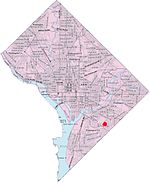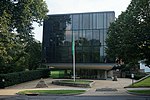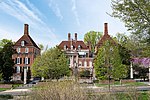Kahlil Gibran Memorial Garden (Washington, D.C.)
1991 establishments in Washington, D.C.1991 sculpturesArtworks in the collection of the National Park ServiceBronze sculptures in Washington, D.C.Embassy Row ... and 5 more
Kahlil GibranMonuments and memorials in Washington, D.C.Outdoor sculptures in Washington, D.C.Public art stubsSculptures of men in Washington, D.C.

The Kahlil Gibran Memorial Garden is a public garden located at 3100 Massachusetts Avenue, N.W. Washington, D.C., "within a wooded ravine known as Woodland-Normanstone Park". At its center are a bronze sculpture of the Lebanese-American writer, poet and visual artist Kahlil Gibran by Gordon Kray and a star-shaped fountain surrounded by limestone benches engraved with quotes of Gibran. The memorial garden was dedicated on May 24, 1991, by President George H. W. Bush. The fundraising was organized by the Kahlil Gibran Centennial Foundation, formed to celebrate the 100th anniversary of the poet's birth in Bsharri.
Excerpt from the Wikipedia article Kahlil Gibran Memorial Garden (Washington, D.C.) (License: CC BY-SA 3.0, Authors, Images).Kahlil Gibran Memorial Garden (Washington, D.C.)
Massachusetts Avenue Northwest, Washington
Geographical coordinates (GPS) Address Nearby Places Show on map
Geographical coordinates (GPS)
| Latitude | Longitude |
|---|---|
| N 38.920472222222 ° | E -77.061388888889 ° |
Address
Khalil Gibran Memorial
Massachusetts Avenue Northwest
20008 Washington
District of Columbia, United States
Open on Google Maps










